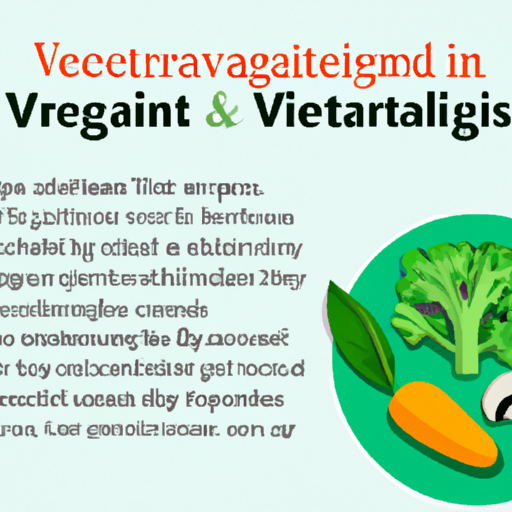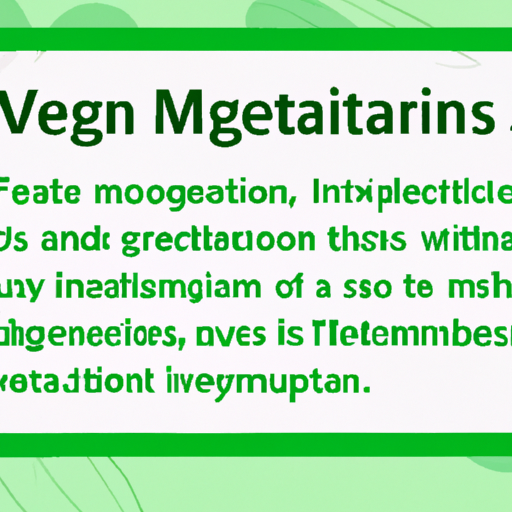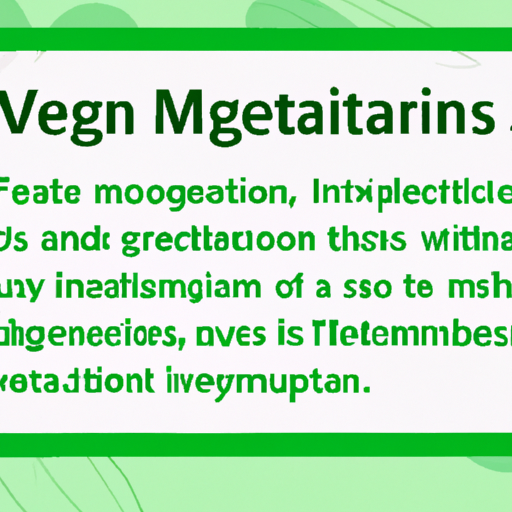So, you’ve made the decision to become a vegetarian, that’s great! You’re probably wondering if there are any supplements you should consider to ensure you’re getting all the necessary nutrients. Well, the good news is that with a well-planned vegetarian diet, it’s definitely possible to meet your nutritional needs without relying on supplements. However, there are a few key nutrients that may require some extra attention.
First and foremost, let’s talk about vitamin B12. This vitamin is primarily found in animal products, so it can be a bit challenging for vegetarians to get enough. To make sure you’re getting an adequate amount, consider including foods fortified with B12 in your diet, such as fortified plant-based milks, cereals, and nutritional yeast.
Next, let’s discuss omega-3 fatty acids. These are essential for heart and brain health, and they’re commonly found in fatty fish. However, as a vegetarian, you can still get omega-3s from plant-based sources like flaxseeds, chia seeds, walnuts, and hemp seeds. If you’re concerned about meeting your omega-3 needs, you may also consider taking an algal oil supplement, which is derived from algae and provides a vegan source of these beneficial fatty acids.
In conclusion, while you can obtain most of the necessary nutrients from a well-planned vegetarian diet, there are a few supplements you may want to consider to ensure you’re meeting all your nutritional needs. Vitamin B12 and omega-3 fatty acids are two key nutrients that may require some extra attention. Incorporating fortified foods and plant-based sources into your diet can help, and if needed, supplements like algal oil can be a suitable option. To learn more about vegetarian nutrition and how to meet your specific needs, keep reading our article. As a vegetarian, you may often wonder whether you are getting all the necessary nutrients from your diet. While a well-planned vegetarian diet can provide all the essential nutrients, there are a few nutrients that may require special attention. In this article, we will explore the importance of a vegetarian diet, discuss the nutritional needs of vegetarians, and highlight potential deficiencies that may arise. We will also delve into the essential nutrients for vegetarians and the recommended supplements that can help meet these needs.

Nutritional Needs of Vegetarians
As a vegetarian, it is crucial to ensure that you are consuming a well-balanced diet that meets all your nutritional needs. While vegetarians can obtain most of the required nutrients from plant-based sources, there are a few nutrients that may be lacking or present in lower amounts in a vegetarian diet. These include protein, iron, calcium, vitamin B12, and omega-3 fatty acids.
Protein
Protein is an essential macronutrient that is responsible for building and repairing tissues, producing enzymes and hormones, and supporting a healthy immune system. While animal products are excellent sources of protein, vegetarians can obtain sufficient protein from plant-based sources such as legumes, tofu, tempeh, seitan, quinoa, and nuts and seeds. However, it is recommended to consume a variety of these protein-rich foods to ensure you are meeting your protein needs.
Iron
Iron is a vital mineral that is necessary for the production of red blood cells and oxygen transport in the body. While iron is more readily absorbed from animal sources, vegetarians can obtain iron from plant-based sources such as dark leafy greens, lentils, beans, fortified cereals, and dried fruits. It is important to note that the iron from plant-based sources (non-heme iron) is not as easily absorbed as the iron from animal sources (heme iron), but consuming vitamin C-rich foods can enhance iron absorption.
Calcium
Calcium is essential for maintaining strong bones and teeth, regulating muscle function, and supporting nerve transmission. While dairy products are commonly associated with calcium, vegetarians can obtain calcium from plant-based sources such as fortified plant-based milk alternatives, tofu made with calcium sulfate, dark leafy greens like kale and collard greens, and calcium-fortified orange juice. Calcium citrate and algae-based calcium supplements are also available for those who may have difficulty obtaining enough calcium from their diet alone.

Vitamin B12
Vitamin B12 is a crucial nutrient that is primarily found in animal products. It plays a vital role in red blood cell production, nerve function, and DNA synthesis. As a vegetarian, it is vital to include fortified foods like breakfast cereals and plant-based milk alternatives in your diet. Alternatively, you can consider taking vitamin B12 supplements such as cyanocobalamin or methylcobalamin. Consulting a healthcare professional will help determine the appropriate dosage for your specific needs.
Omega-3 Fatty Acids
Omega-3 fatty acids are beneficial fats that are important for heart health, brain function, and reducing inflammation in the body. While fatty fish is a primary source of omega-3 fatty acids, vegetarians can obtain them from plant-based sources such as flaxseeds, chia seeds, walnuts, and hemp seeds. Additionally, algae-based omega-3 supplements are available for vegetarians who want to ensure they are meeting their omega-3 fatty acid requirements.
Recommended Supplements for Vegetarians
While it is possible to obtain all the necessary nutrients from a well-balanced vegetarian diet, there may be instances where it is difficult to meet specific nutrient requirements. In such cases, supplements can be a valuable addition to your diet. Let’s take a closer look at the recommended supplements for vegetarians.
Protein Supplements
If you find it challenging to meet your protein needs through food alone, protein supplements can be a convenient option. Plant-based protein powders derived from sources like peas, rice, and hemp can provide a concentrated source of protein. Soy-based protein products, such as tofu, tempeh, and edamame, are also excellent sources of protein for vegetarians. Additionally, hemp protein powder can be a suitable choice for those looking to incorporate more plant-based protein into their diet.
Iron Supplements
Iron deficiency is one of the most common nutrient deficiencies worldwide, and vegetarians may be at a higher risk due to the lower bioavailability of iron from plant-based sources. If you are unable to meet your iron needs through food alone, iron supplements can help bridge the gap. Ferrous iron supplements in the form of ferrous sulfate, ferrous fumarate, or ferrous gluconate are commonly available. However, it is important to note that excessive iron intake can have adverse effects, so it is best to consult a healthcare professional for personalized advice.
Calcium Supplements
Calcium is crucial for maintaining strong bones and teeth, but it can be challenging for vegetarians to obtain sufficient amounts solely from plant-based sources. If you are unable to meet your calcium needs through diet alone, calcium supplements can be beneficial. Calcium citrate supplements are well-absorbed, making them an effective option. Algae-based calcium supplements derived from marine algae are another viable choice for vegetarians. Additionally, opting for fortified plant-based milk alternatives can help increase your calcium intake.
Vitamin B12 Supplements
Vitamin B12 is primarily found in animal products, making it difficult for vegetarians to obtain adequate amounts solely through their diet. As mentioned earlier, fortified foods like breakfast cereals and plant-based milk alternatives can provide some vitamin B12. However, to ensure you are meeting your vitamin B12 needs, supplements such as cyanocobalamin or methylcobalamin can be considered. Regularly monitoring your vitamin B12 levels and consulting a healthcare professional will help you determine the appropriate dosage for your specific needs.
Omega-3 Fatty Acid Supplements
Omega-3 fatty acids are essential for overall health, but they are most commonly associated with fatty fish. As a vegetarian, you can still obtain omega-3 fatty acids from plant-based sources like flaxseeds, chia seeds, walnuts, and hemp seeds. However, if you find it challenging to incorporate these foods into your diet, algae-based omega-3 supplements can be an effective alternative. These supplements are derived from algae, which is a primary source of omega-3 fatty acids for fish.
Consulting a Healthcare Professional
While the information provided in this article can serve as a general guide, it is important to consult a healthcare professional for personalized advice. They can assess your nutritional needs, help determine if any nutrient deficiencies exist, and recommend the appropriate supplements to address those deficiencies. Regular monitoring of your nutrient levels can also help ensure you are meeting your nutritional needs as a vegetarian.
Conclusion
As a vegetarian, it is essential to pay attention to your nutritional needs to maintain optimal health. While a well-planned vegetarian diet can provide all the necessary nutrients, certain supplements may be beneficial to meet specific requirements. Protein, iron, calcium, vitamin B12, and omega-3 fatty acids are nutrients that vegetarians should pay close attention to. Incorporating supplements like protein powders, iron supplements, calcium supplements, vitamin B12 supplements, and omega-3 fatty acid supplements can help bridge any nutritional gaps. However, it is important to consult a healthcare professional for personalized advice and to ensure you are meeting your specific nutrient needs. With the right approach and guidance, you can maintain a healthy and balanced vegetarian diet.
